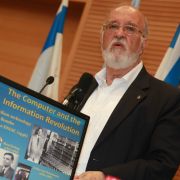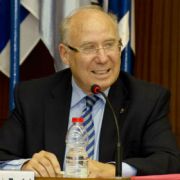BOG 2015: Symposia Engage Audiences
Among the inauguration ceremonies, award presentations and elegant dinners at Tel Aviv University's annual Board of Governors meeting this May, the University’s more than 400 guests enjoyed a variety of expert panels. Three wide-ranging symposia provided new perspectives on the most pressing contemporary issues.
Creating an Innovative Ecosystem: How TAU Is Leading the Way
At the Innovative Ecosystem Symposium, Prof. Yesha Sivan, Executive Director of the Coller Institute of Venture at TAU; Dr. Miri Yemini, of TAU’s Jaime and Joan Constantiner School of Education; and Dr. Aliza Inbal, director of TAU's Pears Program for Global Innovation at the Hartog School of Government and Policy addressed how and why TAU and Israel are at the forefront of innovation. Prof. Sivan described the "messy, fast and global" nature of the venture capital ecosystem. Dr. Yemini explained the role of innovation in schools as a force for a better future, saying that "Out-of-the-box thinking and proactive opportunity-seeking help develop more well-rounded, globally-engaged people.” Dr. Inbal spoke about her group's efforts to harness Israeli technology and innovation to create practical solutions on the ground in developing countries, primarily in Africa and Asia.
Evolving Paradigms: International Relations Today
The Geopolitical Symposium delved into the information environment in the U.S., the crisis of politics in the Middle East and the new global arena and its rapid rate of change, with speakers Mr. Ido Aharoni, Consul General of Israel in New York; Prof. Itamar Rabinovich, former President of TAU; and Mr. Aleksander Kwasniewski, former President of Poland and 2015 recipient of the George S. Wise Medal. Speaking about the perception of Israel in the US, Mr. Aharoni said, "We [Israel] are defined by our own problems and imperfections. In other words, we exist in the mind of the average American only through the Palestinian-Israeli conflict." Prof. Rabinovich discussed the current instability in the Middle East and how it affects Israel. "The Arab world is in a state of crisis where the strong system of Arab states no longer exists and where there is no longer a rhyme or reason to politics in the Middle East," he said. Mr. Kwasniewski focused on the current "speed of change" in international developments, which he called "much more rapid than in any other time in history…In the past, we weren't obliged to react immediately to events that affect our lives, but we have to do that now."
Social Issues Unplugged: Straight Talk on Current Dilemmas
The Social Issues Symposium honed in on the dilemmas we face in our modern lives, with a lens on education, healthcare data and the work-family interface. Prof. Dan Ben David from TAU’s Department of Public Policy spoke about growing education inequality among the various sectors of Israeli society, cautioning that while the country is successful in the technology field, large disadvantaged communities “are not being given the tools to thrive in this economy,” causing the income gap to expand. Prof. Varda Shalev of TAU’s Data Science Center and Maccabitech spoke about medical informatics, explaining the importance of patient databases in advancing screening and diagnosis practices. She added that TAU’s Data Science Center provides an exciting opportunity to collect cross-faculty data, which can “improve the way physicians work, share insight into practices and provide better care for patients.” Finally, Prof. Rachel Gali Cinamon, Head of the Department of School Counseling and Special Education at the Jaime and Joan Constantiner School of Education, addressed the stresses of combining a career and a family life. She spoke about a three-part course that she implemented for young adults, which involves exploring this modern balancing act, collecting information about it and building skills through training and role-playing exercises. So far, she said, more than 500 Israelis have taken the course over a five-year period, and it has proven itself to be a very effective tool in contributing to the future well-being of children and society.






